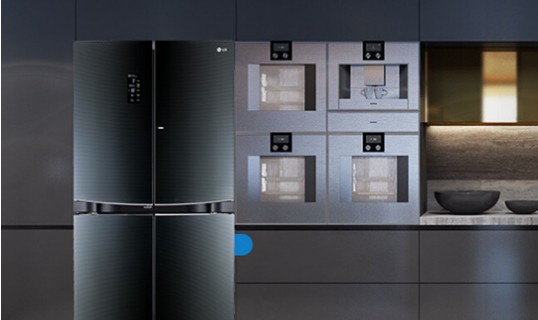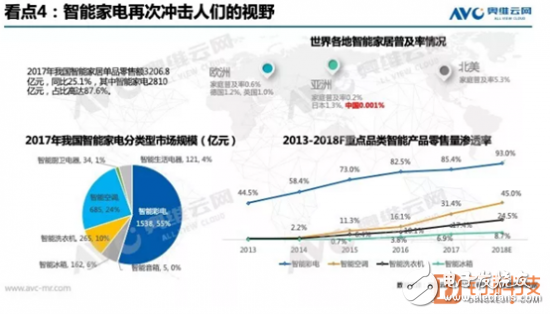The intelligentization of home appliances is in progress. Among the main major home appliances, color TVs have the highest intelligence rate, and the intelligent penetration rate of air conditioners and washing machines is also increasing. Only the intelligent process of refrigerators is relatively slow. So, is the refrigerator company not paying enough attention, or the relevant technology is not perfect, or the user side does not accept it?

Let's start by looking at a set of data. According to data from Aowei Cloud, the retail sales of smart home products in my country in 2017 was 320.68 billion yuan, of which smart home appliances were 281 billion yuan, accounting for 87.6%. This shows that with the development of smart homes, the overall intelligence of home appliances is accelerating, and the acceptance of users is relatively high.
But not all home appliance categories are rapidly transitioning to intelligence. The data shows that in 2017, the smart color TV market size was 153.8 billion yuan, accounting for 55% of the smart home appliance market; followed by smart air conditioners, with a market size of 68.5 billion yuan, accounting for 24%; smart washing machines The market size was 26.5 billion yuan, Accounting for 10%; smart refrigerators are only 16.2 billion yuan, accounting for 6%.

From the perspective of intelligent penetration rate, the intelligent penetration rate of color TVs in 2018 was as high as 93%, and smart TVs have become popular; the intelligent penetration rate of air conditioners is also as high as 45%, and it is believed that it will break through half of the country soon; the intelligent penetration rate of washing machines It also reached 24.5%, with a steady growth; the intelligent penetration rate of refrigerators is the lowest, only 8.7%, an increase of less than 5 percentage points in the past two years.
Obviously, among the four major household appliances such as color TVs, air conditioners, washing machines, and refrigerators, refrigerators have the lowest level of intelligence. So, what is the reason for this phenomenon? According to the analysis of Ding Technology, there are two main reasons:
First, the industry does not have a unified understanding of what a smart refrigerator is. For example, in the opinion of some people, only a large screen can be considered intelligent if it is connected to the Internet; but some people believe that it can be considered intelligent if it has the ability to automatically perceive and process without being connected to the Internet. Therefore, on the product development route, different companies will have different priorities, resulting in not many smart refrigerators perceived by the outside world.
Second, the industry pays more attention to the research and development and publicity of the preservation ability. In the past two years, mainstream refrigerator companies have collectively returned to the research and development and promotion of fresh-keeping capabilities, but they have not been very active in the exploration and promotion of intelligence. Some intelligent technologies are also developed to improve the preservation ability. However, intelligent applications such as online menus, entertainment, and purchasing lack the support of a large number of real scenes in the landing link. All of these result in refrigerators being slightly lower-key in terms of intelligence than other categories.
Nail Technology believes that in the long run, like color TVs, intelligence will become the standard configuration of large appliances including refrigerators, and become an integral part of smart homes; but the implementation of intelligence does not need to be too anxious, it is still necessary to find specific Real application scenarios, intelligence separated from the application environment and scenarios have no practical significance for users except for the added cost.
UCOAX offers LVDS Assemblies service for oversea customer.
Lvds Cable Assembly,Lvds Cables,Lvds Cable Extension,Lvds Cable Assembly Function
UCOAX , https://www.jsucoax.com